 Petzlover
PetzloverCatahoula Cur is originated from United States but Kuri is originated from French Polynesia. Catahoula Cur may grow 25 cm / 10 inches higher than Kuri. Catahoula Cur may weigh 33 kg / 73 pounds more than Kuri. Both Catahoula Cur and Kuri has same life span. Catahoula Cur may have more litter size than Kuri. Both Catahoula Cur and Kuri requires Low Maintenance.
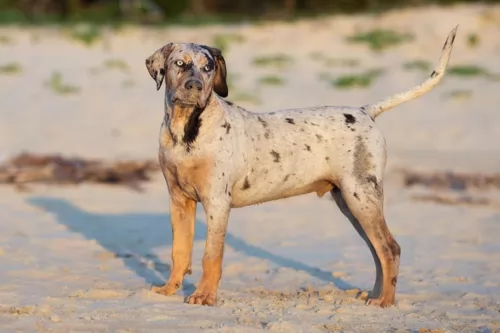 The Catahoula Cur is also known as the Catahoula Leopard Dog or the Louisiana Catahoula. The dog hails from Louisiana, United States.
The Catahoula Cur is also known as the Catahoula Leopard Dog or the Louisiana Catahoula. The dog hails from Louisiana, United States.
It is thought that the Catahoula Cur or Catahoula Hound as it is also known, used to be a hunting dog. The first settlers in Louisiana needed a strong dog to help them with hunting wild hogs and they bred their dogs with other dogs belonging to the locals. This gave them a strong, resilient dog that could take on the wild hogs and also protect their livestock.
Dogs who have no doubt been brought into the mix to produce the Catahoula Cur are mastiffs, Beaucerons, sighthounds and wolves.They are today more commonly referred to as Catahoula Leopard Dogs.
Kurī, also known as Guri or Peroor New Zealand Native Dog, is the Maori name for this dog which was introduced to New Zealand by the Maoris when they migrated from East Polynesia around 1280 AD.
They were in fact Polynesian dogs which died out in New Zealand. The Māoris would use the dog as a food source and the skins would be used to make some form of clothing. The bones were used to make items such as necklaces and fish hooks.
Not surprising then that the dog became extinct in New Zealand, with the last known Kuri specimens being found in the Museum of New Zealand Te Papa Tongarewa.
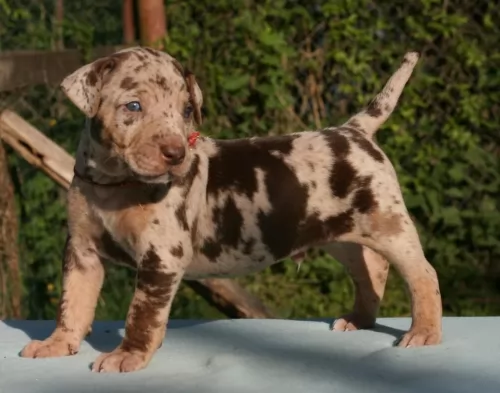 There are varying sizes for Catahoulas and a typical height is 51–66cm and weighing anything from 18 – 51kg. These Cathoula Cur’s come in different colors too, but the leopard-like coat is a dominant feature with this dog.
There are varying sizes for Catahoulas and a typical height is 51–66cm and weighing anything from 18 – 51kg. These Cathoula Cur’s come in different colors too, but the leopard-like coat is a dominant feature with this dog.
While there are solid colors, you can expect red- and blue merle, grey-, black, patchwork and brindle too.
The length of the coat varies somewhat too and while the coat is essentially short and smooth, there are Catahoulas where the coat is a little longer and more coarse.
The eyes of the Catahoula Cur are another interesting feature and both eyes can be the same color, but in some instances the one eye can be brown while the other could be blue, green or gray. The ears of the Catahoula Cur are medium in size and are floppy, dropping down close to the head.
The Catahoula Cur is an intelligent dog and also active and full of sports. You can’t call this dog aggressive, but merely assertive, being strong-willed. He is also affectionate and loyal, loving to spend time with his human family.
He makes a wonderful family pet, complete with children as well as other pets in the home, more so when he has been trained and socialized. These dogs are bright and alert and they also make excellent watch dogs. People who have owned a Catahoula Cur will tell you that these are wonderful pets, full of life and personality.
The Kuri is extinct now but it was a small to medium sized dog with a thick set neck. He stood between 25 and 46cm and weighed about 13 to 15 kilograms.
He had thick medium-length rough textured hair, small head, erect ears, short legs and a bushy tail. The color of their weatherproof coats varied and some were black, some white or cream and some were a mix of colors and patterns.
An interesting feature about them is that they didn’t bark but instead they howled. They were good at hunting birds.
The Kuri wasn’t considered the brightest breed, but he would have benefited from some training and socialization as this just makes a dog a better pet in every sense – more obedient and better behaved in all situations.
Some Kuris were friendly and able to bond with their human owners, while others were independent and somewhat aloof. Their size would have allowed them to be kept in the city or the country as they weren’t particularly energetic dogs, not requiring much ground to run around in.
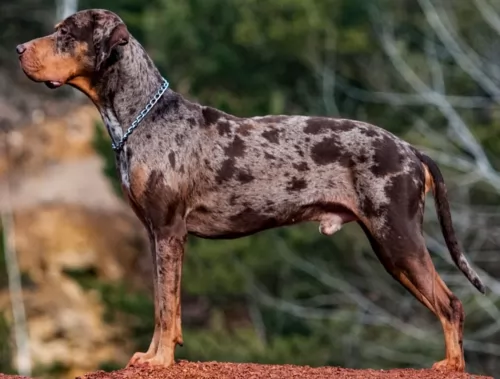 Catahoula dogs are the kind of dogs that make perfect family pets as they are all rounders. They’ve got characteristics that everybody wants in a dog. They are naturally protective, even they are not described as aggressive dogs. With training and socialization they get on well with children as well as other pets in the home. He is alert and territorial, which makes him a good watchdog, more so because he doesn’t particularly like strangers.
Catahoula dogs are the kind of dogs that make perfect family pets as they are all rounders. They’ve got characteristics that everybody wants in a dog. They are naturally protective, even they are not described as aggressive dogs. With training and socialization they get on well with children as well as other pets in the home. He is alert and territorial, which makes him a good watchdog, more so because he doesn’t particularly like strangers.
Intelligent and independent, training makes him wonderfully obedient and relaxed. However, give him the chance for ball games and a walk, and he is more than ready.
He is used to being a guard- and hunting dog, and this makes him an active, energetic dog. You will need to give him plenty of activities if you don’t want this amicable dog becoming anxious, frustrated and destructive.
Exercise him well, provide him with nourishing, top quality food together with fresh water and shower him with the love and attention he deserves as a family member. You’ll also join the ranks of Catahoula Cur owners who want to tell others about what an awesome pet he makes.
It appears as though some Kuris were kept as pets and that they were able to develop loving relationships with their owners.
We don’t know too much about the extinct Kuri, but scientists are now studying and analyzing the hairs of the dog to find out more about it, and specifically why the Maori dog disappeared some time in the 19th century without a trace.
They will also be analyzing Kuri bones salvaged by archaeologists and which were found on rubbish heaps. These bones can be tested to see whether the diet of the Kuri changed much between the days of Maori settlements and the arrival of the European settlers.
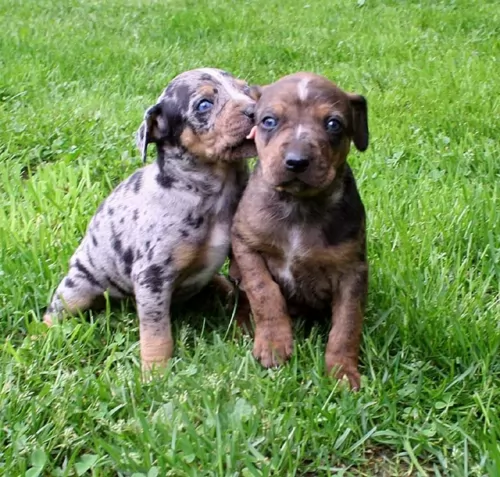 When you buy a Catahoula Cur, you can know that your pet is going to be fairly healthy, however there will be some common health issues to look out for, and by knowing about these health concerns, you can be better prepared.
When you buy a Catahoula Cur, you can know that your pet is going to be fairly healthy, however there will be some common health issues to look out for, and by knowing about these health concerns, you can be better prepared.
Your Catahoula Cur will be susceptible to some bacterial and viral infections which can be life threatening for him if he gets them. Some of these are parvo, distemper and rabies. That is why it is important to have your pet vaccinated, which can start at about 8 weeks of age for a puppy.
Obesity is a world-wide problem with humans and with their pets and it can open up a whole lot of problems with your pet’s health that he otherwise might not have got. It can play havoc with your pet’s digestion, and it can cause joint problems too.
It can be so tempting to pop a sweet treat into your pet’s mouth because you love him so much, but get to know what foods can actually be hazardous for him.
Some Kuri dogs scavenged while others were pets and ate well. The lifestyle they led would have determined their health. In those days they would have suffered with dental disease, common in adult dogs. Left untreated, dental disease can lead to dental tartar buildup with gum inflammation and tooth loss.
Dental disease can also lead to other organ diseases. These days brushing your dog’s teeth with canine toothpaste and toothbrush can help to ward off dental disease.
Those Kuris that weren’t pets, tried to survive scavenging, and their homeless situation could well have led to ear infections – caused from a wax- and dirt buildup within the ear. He would have been frantic trying to scratch his ears. In modern times, if your dog showed signs of an ear infection, you would need to get him to the vet.
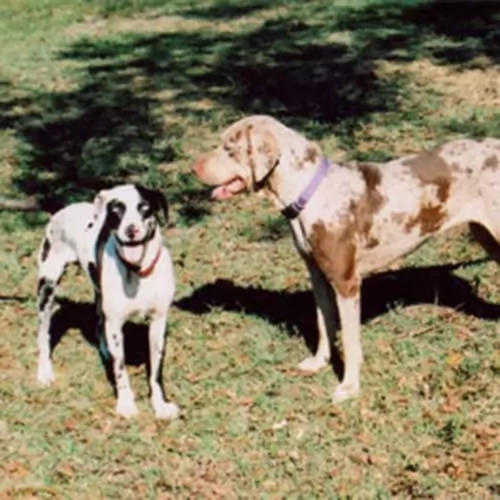 Your Catahoula Cur isn’t a high maintenance dog and a good brushing 2 times a week will keep his leopard coat looking shiny and free of loose hairs.
Your Catahoula Cur isn’t a high maintenance dog and a good brushing 2 times a week will keep his leopard coat looking shiny and free of loose hairs.
Catahoula’s have good teeth, and you want to keep them that way by brushing them at least 2 or 3 times a week to prevent dental decay and a host of other medical issues.
The Kuri will have required regular grooming which means a brushing down twice a week. Brushing would have been useful to prevent loose hairs from shedding with the dog. He would have had to have his ears and eyes checked too to avoid infections. Brushing him would have given his owner the chance to check him over for fleas and ticks too.
As the Kuri wasn’t an overly energetic dog, a walk a day would have kept him content and fit.
The Kuri was a dog that essentially formed part of someone else’s diet. Those that managed to escape being a meal for someone no doubt had to scavenge for food. Because they were used to help people catch birds, they themselves were used to catching birds for themselves.
As a small to medium sized dog, if you were to keep such a dog as a pet you would have given him a cup or two of dried kibble a day and tried to vary his diet by including some home-cooked food and raw meat.